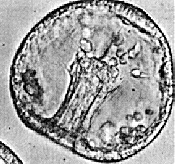
Biology 7
Introduction to the Genetics and
Development of Organisms
|
Dr. Ted Lee, 305 Biology, pbx 5395, e-mail leet. Dr. David Marcey, 307 Biology, pbx 5392,
|
 |
|
Required Text: Life, the Science of Biology, by Purves, Orians, & Heller, 5th ed. Additional Required Reading: Articles on reserve in Olin &Handouts handed out in class. Multimedia Tutorial: Flowers, Mendelian genetics simulation; Plasmid, restriction cutting simulation. You are required to master both these simulation programs. They can be run on any NT machine, from p:\data\biology\biol07\tutorial\flowers.exe or plasmid.exe. Or you can drag the Tutorial directory onto a floppy, and run the programs on your own PC, using Win3.1 or Win95. Genetics Electronic Companion, Cogito. Runs on Win 3.11, 95, NT. Optional purchase at Bookstore. This program is most useful for students who have difficulty with genetics concepts. Supplemental Learning Material: Your instructors will provide additional learning aids that are accessable on the WWW or on the local Kenyon network. Many slides and Web pages containing material presented in class can be found online or on the network at p:\data\biology\biol07. Also, there are links on this page to supplemental information such as sample multiple choice test questions and a glossary of some terms used in the class. See linked resources, below. About the course. This course introduces the mechanisms of heredity, the expression of genetic information, and the process of development, including genetic control of development. Genetics and development are part of a continuous process revealing a fundamental kinship of life on earth. Genetics as a tool for the study of biological problems will be introduced, as will some current topics in biotechnology. Students wishing to explore these topics in greater detail are referred to the upper division courses in Genetics, Developmental Biology, Cell Physiology, and Molecular Biology. For a more complete view of basic biology, students should continue in BIOL 6, From Cell to Organism, and BIOL 8, Population and Ecology. Grading. 100% class attendance is expected and attendance will count as 10% of your grade. The remaining 90% will be an average of four, one-hour examinations. The two-hour final exam during final's week is OPTIONAL, and if you choose this option your final exam grade will be substituted for your lowest single test grade of the semester, unless the final exam grade is lower than any of these. So, taking the final exam cannot hurt your grade. How to do well in this class.
Academic Honesty. You must know the rules and standards for academic honesty defined in the Student Handbook. We will prosecute any hint of academic dishonesty to the fullest extent through the AIB. Disability. If you have a disability and therefore may have need for some type of accommodation(s) in order to participate fully in this class, please feel free to discuss your concerns in private with me AND be sure to contact Dean Jane Martindell at PBX 5145 or via electronic mail at MARTINDELLJ. |
| DATE | TOPIC | READING | INS. | |
| January | 19 21 |
History of Genetics; Flowers Identification of DNA as the Genetic Material; The Structure of DNA |
Ch. 10 Ch. 11 p. 243-250 |
TL |
| January | 26 28 |
The Gene DNA Replication; Mutations |
Ch. 12 p. 260-265 Ch. 11 p. 250-258 Ch. 12 p. 274-279 |
TL |
| February | 2 4 |
Transcription Translation |
Ch. 12 p. 265-268 Ch. 12 p. 268-274 |
TL |
| February | 9 11 |
Exam 1 Exchange of Genetic Information |
Ch. 9 | TL |
| February | 16 18 |
Bacterial Genetics Prokaryotic Gene Expression; Plasmid |
Ch. 13 p. 282-298 Ch. 13 p. 298-303 |
TL |
| February | 23 25 |
Eukaryotic Gene Expression Recombinant DNA Technology |
Ch. 14 Ch. 16 |
TL |
| March | 2 4 |
The Human Genome Project Exam 2 |
Ch. 17 p. 393-397 | TL |
| March 6 - March 21, SPRING VACATION !!! | ||||
| March | 23 25 |
Intro/History of Developmental Biology/Gametogenesis Gametogenesis, continued |
Ch. 39 p. 857-865 Ch. 37 p. 865-877 (Slideshow 1) |
DM |
| March April |
30 1 |
Fertilization Cleavage - becoming multicellular |
Ch. 40 p. 883-888 Ch. 40 p. 888-890 (Slideshow 2) |
DM |
| April | 6 8 |
Gastrulation and the body plan Gastrulation |
Ch. 40 p. 890-896 Ch. 40 p. 896-902 (Slideshow 3) |
DM |
| April | 13 15 |
TEST 3
(sample questions) (score distributions) Gastrulation, continued |
--------- --------- |
DM |
| April | 20 22 |
Neurulation + Developmental Programs and The Theory of Differential Gene
Expression TDGE, continued & Mechanisms of Gene Regulation in Development |
Ch 15 p. 330-338 Article* ("The Cloning of Cumulina") (Slideshow 4) |
DM |
| April | 27 29 |
Paradigms of MGRD: Sex Determination & Pattern Formation Paradigms of MGRD, continued |
Ch. 15 p. 339--350; reread Ch 10, p. 233-238 Article* ("Smart Genes"); Ch. 36 p. 788-794; Ch.35 p. 764-770 (Slideshow 5) |
DM |
| May | 4 6 |
Paradigms of MGRD, continued + Aspects of Plant Development TEST 4 (sample questions) (score distributions) |
(Slideshow 6) --------- |
DM |
